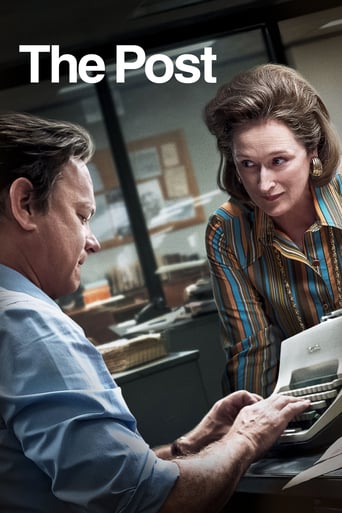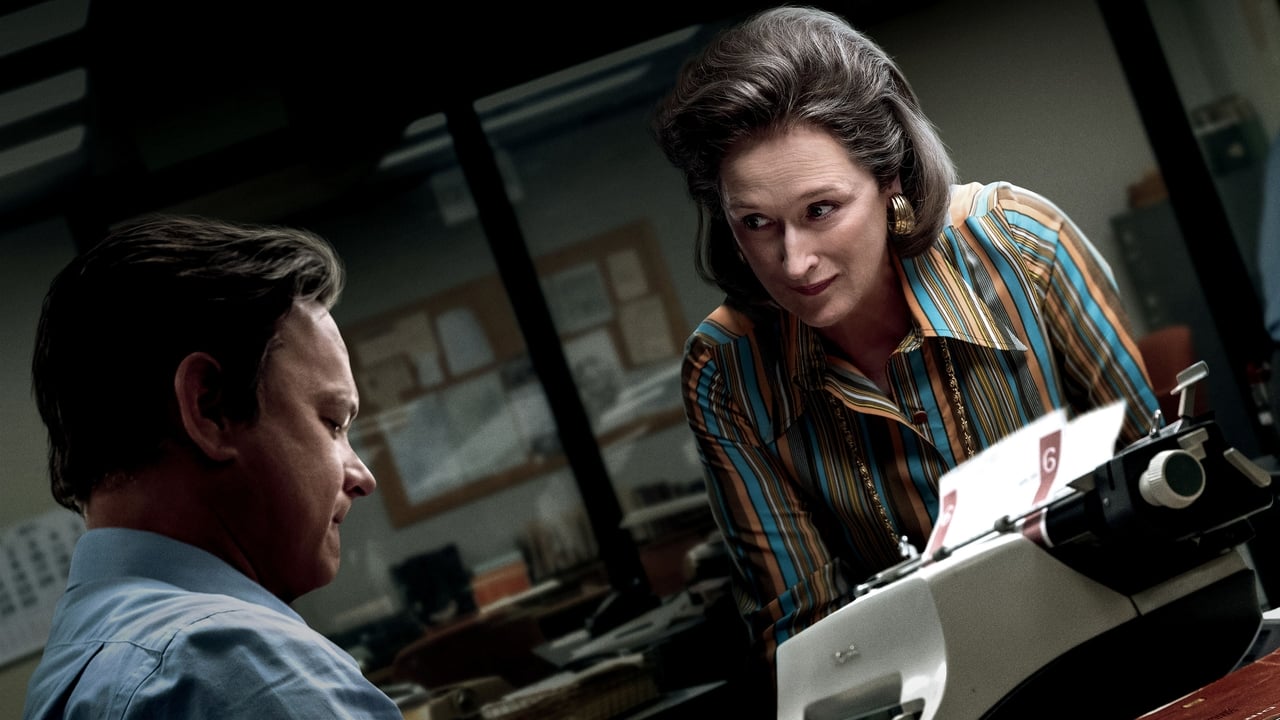michael-young-585
Does Meryl Streep need yet another Oscar? She's been nominated 21 times since 1979, three times for supporting performances, the rest for leading actress. And she has won the Oscar three times for Iron Lady, Sophies Choice, and Kramer v. Kramer. Streep has been hailed as the world's best living actor and will surely rank among the all time best. It seems that all she has to do is appear in a movie and she becomes an Oscar favorite.And so it was this year with The Post, Steven Spielberg's drama detailing the second chapter in the publication of the Pentagon Papers in the early 70s. After the Nixon administration successfully brought an injunction against the New York Times for starting to publish the massive Pentagon study of the Vietnam war, the Washington Post obtained the papers and then the paper's new publisher, Katherine Graham, had to make an existential decision about whether to pick up where the Times and left off and risk the legal hell that the Nixon administration was sure to bring upon them. We already know the outcome, of course, as history tells us that Ms. Graham did indeed approve the publication of the papers. And, of course, Nixon did threaten her and the paper with treason charges. However, shortly after the government began their crackdown, newspapers all over the country picked up the ball and began to publish their own stories based on the papers. At that point, the toothpaste was well out of the tube and wasn't going back in. Shortly after, the Supreme Court, in a landmark ruling, determined that the rights of a free press transcended the privacy rights of the government and that the first amendment was not to benefit the governors, but rather the governed as a necessary and important way to counter the improper use of government power.The reason to see this movie is not because it is exceptionally well done. In fact, although nominated for Best Picture, it definitely does not deserve it. But the picture should be seen because of how relevant it is to today's political world. As our unfit President labels any press institution that remotely criticizes him (or has the audacity to actually report his bad behavior) 'Fake News', the first amendment rights to a free press are under attack. I never anticipated that in my lifetime I would be witnessing the systematic destruction of one of the few institutions capable of stopping the accumulation of fascist power. And yet, Trump, and his mindless minions actually claim that he has the power to shutdown those news organizations that he does not like, simply because he is the President. That this is frightening is an understatement. But the value of this movie is that it shows what can, and should, happen when a President claims undue power. Nixon's attack on the press was halted by the Supreme Court. Forced to adopt other means, he sent third rate burglars into Daniel Ellsberg's psychiatrist office and the Democratic Party Headquarters in Watergate. Those actions eventually brought him down. We can only hope that Trump's assaults on the press will have similar effects.So, the reason to see this movie is because it is astonishingly topical. Some of the lines used by politicians on both sides are almost verbatim quotes of statements heard today. The arguments are not just similar, but nearly exactly the same. The good thing about all that is that, 45 years ago, the press survived and corrupt power fell. The bad thing is that we seem not to have learned a damn thing and, miserably, we are letting history repeat itself.But having said that people should indeed see this movie because of its relevance to current day politics, I don't think it is a particularly good movie for several reasons.In the first place, I don't understand why the movie is about the second chapter in the story, the Washington Post story, instead of the original publication of the papers by the New York Times. I get the fact that there is a gender story underlying the Washington Post story. Katherine Graham had just inherited control of the Washington Post newspaper because, after both her father and her husband died, she was the senior family member available. And I understand that she had a horrendously difficult, and risky, decision to make in picking up where the Times had been stopped. She was likely exposing both her family and her employees to potential treason charges that could have destroyed everything she and her family had built up. But the decision by Sulzberger, of the New York Times, to originally begin the publication and then to fight the Nixon administration for the right to continue, seems to me to be an even bigger decision. The Times took the initial, very risky, step, and yet, aside from a mostly irrelevant 2003 television movie (The Pentagon Papers), there has been no movie describing the family and business crisis that had to have happened at the Times. Theirs was the riskier decision, so where's the movie about Ellsberg and the New York Times? In short, I think we're not seeing the best and most interesting story here.And then, there is simply the problem of Meryl Streep's fame. Graham is new to her role as leader of the Post and there are many scenes in the movie where she shows indecisiveness and inability to speak up, especially in a room full of men. Meryl Streep, on the otherhand, we know has no problems taking on nearly any situation. Whether it is the British government (Iron Lady), the fashion world (Devil Wears Prada), or deciding which of her children should live (Sophies Choice), Streep moves her characters forward forcefully - they are not weak. So when she plays a character that has difficulty making decisions, it is not convincing. Not because the character couldn't be weak, but because Meryl Streep doesn't play those kinds of characters! In the movie, there is a critical, climactic scene where she, as Graham, makes the immediate and final decision to go ahead and publish their story in the morning's paper. She is in a room full of men, dressed in what appears to be her bathrobe. They have just had heated conversations about the importance of the decision and the possible consequences which include the complete loss of the paper, jail sentences for the leaders, and unemployment for hundreds of workers. Graham, on the phone, pauses for just a few seconds, furrows her brow, hesitates a couple of times, and then says to publish. She hangs up the phone, and announces that she is going to bed.The scene may or may not be accurate, and it very well may be what Katherine Graham did. But it is not what Meryl Streep would do. We would have more understanding of what went through her mind to get to that decision and, here, we have nothing. It is unfortunate that actors end up getting typecast, but they do. And it is difficult, often, for the viewer to separate the character from the actor. In this case, though, Streep shouldn't be playing Graham. As fine a job as Streep did, this isn't best actress material for her, because it isn't the right role for her. I don't fault Streep so much as Spielberg for casting her.So, there you have it. The movie is worth seeing because of its relevance to contemporary politics. But it is a highly flawed movie because it is the wrong story with the wrong actress. All of that makes it difficult to rate, but I'm inclined to give it just 3 stars.
samjulian88
First of all, I'm not sure if those who rated this movie 5 and above, watched the same movie as I did. Pretty sure that this movie was not directed by Steven Spieldberg, could have been a distant relative of his.If you are able to get past the aging face or the equally repulsive facial make up of Meryl Streep, you are put with watching an hour and a half of sleepy, dull, ever bored, and a weak Streep. Dare I say, she was irresponsible, always trying to get a nap, even when the board is busy. Suddenly in the last ten minutes of the movie, she's a whole another person, full of charisma and she actually starts taking all the calls for Washington Post. The transference of her character is incredible and there's nothing to justify the same. Also there's a scene at the end of the movie, where tens of women, surprising gathered at one side of the court entrance are in awe of Meryl. Why the women were all towards one side is not explained.The movie's story had a huge potential. Sadly it was not utilized. Tom and one more guy, justified their roles. There's actually no character development for the rest of the multitude of men in this movie.And then there's the cliche of how reporters are trying to get their story published first. Often you get the idea that Washington Post is doing this for themselves and not to stop the war or prevent American soldier's death or Vietnamese deaths or getting the news to the public.In all, it's an indifferent direction with a massive cast. Meryl, please retire!
petercarlsson-92297
This movie is only for the liberals who's just interested in one side of a story. Cardboard characters, stiff acting, boring script, and moralizing until your throat is filled. I never thought Spielberg, Hanks and Streep could do something so bad as this sleeping pill.
On the level of movie of the week, but with over paid actors and director.
Oh well, not the first time that money stands in the way of quality.
vogttho
In the movie: Nixon was furious about the Papers' release.
In reality: Nixon was intially unfazed because the Papers tarnished his Democratic predecessors.
In the movie: McNamara tries to stop the Post from running the story.
In reality: He supported publication.
In the movie: The Post's decision to print inspires other newspapers.
In reality: Other newspapers published the documents based on the leakers' distribution plan.Long ago in a galaxy far far away...



 AD
AD




















